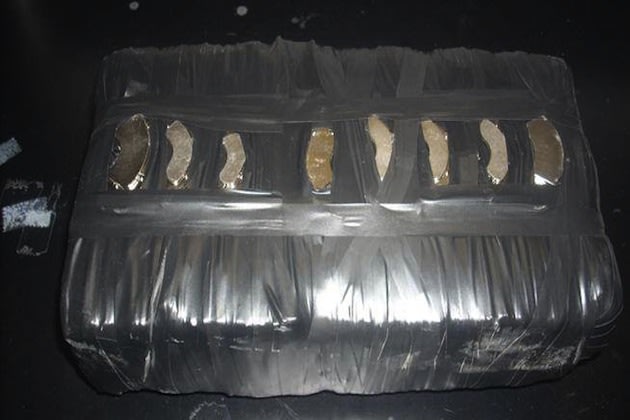[ | E-mail |
Contact: Kevin Punsky
punsky.kevin@mayo.edu
904-953-2299
Mayo Clinic
JACKSONVILLE, Fla. Researchers at Mayo Clinic's campus in Florida have discovered a protein that is overly active in every human sample of kidney cancer they examined. They also found that an experimental drug designed to block the protein's activity significantly reduced tumor growth in animals when used alone. Combining it with another drug already used to treat the cancer improved the effectiveness of both.
The findings, reported in the April 30 online issue of Clinical Cancer Research, offer a much-needed potential new direction for the treatment of clear cell renal cell carcinoma, which accounts for almost 85 percent of kidney cancer cases in the United States. More than 57,000 diagnoses of kidney cancer occur yearly in the U.S. with greater than 13,000 deaths.
"There is a clear need for new therapies for this common cancer. With very few exceptions, patients inevitably become resistant to all available treatments," says the study's senior investigator, molecular biologist John Copland, Ph.D.
Their findings might be relevant to the treatment of other cancers, says Christina von Roemeling, the study's lead author. The protein they identified is produced by the stearoyl CoA desaturase 1 (SCD1) gene, which has also been found to be over active in a number of other cancers, including lung, stomach, breast, prostate, ovary and colon cancers.
"This is a gene that is highly active in a lot of other cancers and it may be that the agent we tested could provide new clinical avenues in those cancers as well," von Roemeling says.
The experimental drug, A939572, is a targeted inhibitor of SCD1 protein. "We found it to be incredibly specific to cancer cells in laboratory mice treated with the agent," Dr. Copland says. "But these are early days in the testing of this agent for cancer."
Not only is SCD1 active in some cancers, it also is being investigated for its role in promoting obesity and diabetes, the researchers say. Scientists are also testing A939572 as an antidote to those conditions.
The Mayo Clinic scientists performed a genome screen of tissue samples from 150 kidney cancer patient tissue samples, which represented all stages of cancer progression, to identify genes that are significantly overexpressed, compared to noncancerous tissue samples. SCD1 was one of their top finds.
They then disabled SCD1 in laboratory kidney cancer cells and found that the tumor cells stopped growing and a large percentage died.
Next, researchers tested A939572 and the federally approved kidney cancer drug temsirolimus. They found that using either agent alone cut tumor growth by up to 25 percent in mice studies, but using both drugs together, and at lower doses, reduced it 60 to 70 percent.
"The synergy between the drugs was very striking, suggestive of significant clinical benefit in patients," Dr. Copland says.
Von Roemeling says that SCD1 protein expression offers a novel molecular prognostic biomarker in kidney cancer that could guide therapy.
The study was funded by National Cancer Institute grants R01CA104505, R01CA136665 and R01CA104505-05S1; the David & Lois Stulberg Endowed Fund for Kidney Cancer Research; Mr. and Mrs. Ompal Chauhan Kidney Cancer Research Fund; Kidney Cancer Research at Mayo Clinic in Florida; James C. and Sarah K. Kennedy Mayo Clinic Research Career Development Award for Clinicians; Scheidel Foundation; Fraternal Order of Eagles Florida State Auxiliary, and a grant for rare cancers from Dr. Ellis and Dona Brunton.
###
About Mayo Clinic Cancer Center
As a leading institution funded by the National Cancer Institute, Mayo Clinic Cancer Center conducts basic, clinical and population science research, translating discoveries into improved methods for prevention, diagnosis, prognosis and therapy. For information on cancer clinical trials, call 507-538-7623.
About Mayo Clinic
Mayo Clinic is a nonprofit worldwide leader in medical care, research and education for people from all walks of life. For more information, visit http://www.mayoclinic.com and http://www.mayoclinic.org/news.
Journalists can become a member of the Mayo Clinic News Network for the latest health, science and research news and access to video, audio, text and graphic elements that can be downloaded or embedded.
?
AAAS and EurekAlert! are not responsible for the accuracy of news releases posted to EurekAlert! by contributing institutions or for the use of any information through the EurekAlert! system.
[ | E-mail |
Contact: Kevin Punsky
punsky.kevin@mayo.edu
904-953-2299
Mayo Clinic
JACKSONVILLE, Fla. Researchers at Mayo Clinic's campus in Florida have discovered a protein that is overly active in every human sample of kidney cancer they examined. They also found that an experimental drug designed to block the protein's activity significantly reduced tumor growth in animals when used alone. Combining it with another drug already used to treat the cancer improved the effectiveness of both.
The findings, reported in the April 30 online issue of Clinical Cancer Research, offer a much-needed potential new direction for the treatment of clear cell renal cell carcinoma, which accounts for almost 85 percent of kidney cancer cases in the United States. More than 57,000 diagnoses of kidney cancer occur yearly in the U.S. with greater than 13,000 deaths.
"There is a clear need for new therapies for this common cancer. With very few exceptions, patients inevitably become resistant to all available treatments," says the study's senior investigator, molecular biologist John Copland, Ph.D.
Their findings might be relevant to the treatment of other cancers, says Christina von Roemeling, the study's lead author. The protein they identified is produced by the stearoyl CoA desaturase 1 (SCD1) gene, which has also been found to be over active in a number of other cancers, including lung, stomach, breast, prostate, ovary and colon cancers.
"This is a gene that is highly active in a lot of other cancers and it may be that the agent we tested could provide new clinical avenues in those cancers as well," von Roemeling says.
The experimental drug, A939572, is a targeted inhibitor of SCD1 protein. "We found it to be incredibly specific to cancer cells in laboratory mice treated with the agent," Dr. Copland says. "But these are early days in the testing of this agent for cancer."
Not only is SCD1 active in some cancers, it also is being investigated for its role in promoting obesity and diabetes, the researchers say. Scientists are also testing A939572 as an antidote to those conditions.
The Mayo Clinic scientists performed a genome screen of tissue samples from 150 kidney cancer patient tissue samples, which represented all stages of cancer progression, to identify genes that are significantly overexpressed, compared to noncancerous tissue samples. SCD1 was one of their top finds.
They then disabled SCD1 in laboratory kidney cancer cells and found that the tumor cells stopped growing and a large percentage died.
Next, researchers tested A939572 and the federally approved kidney cancer drug temsirolimus. They found that using either agent alone cut tumor growth by up to 25 percent in mice studies, but using both drugs together, and at lower doses, reduced it 60 to 70 percent.
"The synergy between the drugs was very striking, suggestive of significant clinical benefit in patients," Dr. Copland says.
Von Roemeling says that SCD1 protein expression offers a novel molecular prognostic biomarker in kidney cancer that could guide therapy.
The study was funded by National Cancer Institute grants R01CA104505, R01CA136665 and R01CA104505-05S1; the David & Lois Stulberg Endowed Fund for Kidney Cancer Research; Mr. and Mrs. Ompal Chauhan Kidney Cancer Research Fund; Kidney Cancer Research at Mayo Clinic in Florida; James C. and Sarah K. Kennedy Mayo Clinic Research Career Development Award for Clinicians; Scheidel Foundation; Fraternal Order of Eagles Florida State Auxiliary, and a grant for rare cancers from Dr. Ellis and Dona Brunton.
###
About Mayo Clinic Cancer Center
As a leading institution funded by the National Cancer Institute, Mayo Clinic Cancer Center conducts basic, clinical and population science research, translating discoveries into improved methods for prevention, diagnosis, prognosis and therapy. For information on cancer clinical trials, call 507-538-7623.
About Mayo Clinic
Mayo Clinic is a nonprofit worldwide leader in medical care, research and education for people from all walks of life. For more information, visit http://www.mayoclinic.com and http://www.mayoclinic.org/news.
Journalists can become a member of the Mayo Clinic News Network for the latest health, science and research news and access to video, audio, text and graphic elements that can be downloaded or embedded.
?
AAAS and EurekAlert! are not responsible for the accuracy of news releases posted to EurekAlert! by contributing institutions or for the use of any information through the EurekAlert! system.
Source: http://www.eurekalert.org/pub_releases/2013-04/mc-mcf042913.php
forrest gump bernard hopkins devils la riots rachel maddow gia utah jazz













